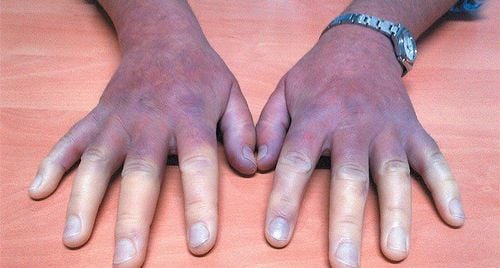This is an automatically translated article.
Autoimmune scleroderma refers to an autoimmune disorder in which the skin and connective tissues grow thick and hard. It is a chronic disease that gets worse over time, which can lead to complications if not treated properly.
1. Epidermolysis overview
Autoimmune scleroderma is classified as a rheumatic disease and a connective tissue disorder. It is also thought to be an autoimmune condition, where the person's own immune system attacks their own tissues. This leads to an overproduction of collagen - a protein that forms the structure of connective tissue. The result is tissue thickening, or fibrosis, and scarring.
Scleroderma can also cause constriction or narrowing of small blood vessels, damaging internal organs due to inadequate blood supply. Although it usually affects the hands, face, and feet, it can also sometimes affect the gastrointestinal tract, heart, lungs, and kidneys.
Anyone can get scleroderma, but women are more at risk than men. Scleroderma affects 75 to 100,000 Americans, mostly women between the ages of 30 and 50. Children can also get scleroderma, but at a fairly rare rate.
Severity of illness ranges from mild to potentially fatal. According to statistics, up to 1 in 3 people with this disease develop severe symptoms. There is no specific treatment for the disease, but some medications are able to relieve symptoms and prevent dangerous complications from occurring.
2. Types of scleroderma
There are many types of scleroderma with different symptoms in each patient. Of these, two main types are:
Localized scleroderma: Affects only small areas of the skin. Occurs more commonly in women, 3 times more than in men; Systemic sclerosis: Affects many parts of the body. Common in women between the ages of 30 and 50.

Xơ cứng cục bộ tại một vị trí nhỏ trên da người bệnh
People with systemic scleroderma should see a doctor as soon as possible. Timely treatment will help prevent the disease from progressing to become severe and life-threatening.
Answering the question "Is scleroderma contagious?", the doctors confirmed that this is not an infectious disease, not contagious, nor is it cancer or malignant tumor cells.
The disease is endogenous, there is no way to prevent scleroderma other than avoiding exposure to some risk factors that you can control. These include triggers in the surrounding environment, such as viruses, drugs, or chemicals.
3. Is scleroderma hereditary?
Risk factors that may increase your risk of developing scleroderma include:
Native American; African American; Female gender; Using certain chemotherapy drugs (such as Bleomycin); Exposure to silica SiO2 dust and organic solvents; Certain changes in the genome; Family history of autoimmune disease. Genetically, most scleroderma patients have no relatives with the disease, and neither will their children have it. In addition to determining that epidermal sclerosis is not an infectious disease, the scientists also say that the disease is not passed on from parents to children.
Research indicates that having a susceptibility gene increases a person's risk of scleroderma, but it is not in itself the cause of scleroderma. Although scleroderma is not directly inherited, some scientists think it tends to run in families with a history of rheumatoid arthritis.

Người bệnh sử dụng một số thuốc hóa trị có thể làm tăng nguy cơ khởi phát tình trạng xơ cứng biểu bì
4. Causes of scleroderma
Doctors don't know the exact cause, but can explain the mechanism that gives you scleroderma.
The problem lies in the immune system, which causes the body to produce too much connective tissue. Normally, connective tissue forms fibers, which form the body's support framework. The structural framework is located under the skin and around internal organs and blood vessels, helping to support muscles and bones.
For some reason, your body makes too much collagen protein. As a result, the skin and other tissues in the body become thicker, less flexible, or fibrous and scar forms.
5. Diagnosis and treatment
The doctor will examine you and ask about the health history of you and your family members. You may be asked to:
Diagnostic imaging : X-rays and CT scans; Blood tests ; Gastrointestinal test; Lung function test; Cardiac tests: Electrocardiogram and echocardiography. The specialist may also take a small sample of skin (called a biopsy) to look at under a microscope.
Treatments for the autoimmune disease scleroderma have improved dramatically over the years. Although there is still no specific and complete cure, there are different ways to help you manage your symptoms. You can talk to your doctor about specific symptoms that are interfering with your daily life. From there, the doctor will adjust the treatment plan so that it is most appropriate and effective.
You can also join the community of people with similar illnesses. Sharing experiences and encouraging each other can make it easier to cope with a chronic condition.

Đo điện tâm đồ có thể giúp các bác sĩ chẩn đoán tình trạng bệnh tự miễn xơ cứng bì
6. Complications of autoimmune scleroderma
As mentioned, proper and timely treatment can reduce the risk of complications of autoimmune scleroderma, including:
High blood pressure in the lungs; Scar tissue in the lungs; Loss of blood flow to fingers and toes; Myositis ; Infection; CKD . In short, the autoimmune disease scleroderma is not contagious, so it won't spread. In addition to environmental factors, genetics are also thought to play a role in the risk of disease onset. However, most patients have no family history of the disease, nor do they pass it on to their children. People with scleroderma only usually come from families with other autoimmune diseases.
To register for examination and treatment at Vinmec International General Hospital, you can contact the nationwide Vinmec Health System Hotline, or register online HERE.
Reference source: Webmd.com; healthline.com, medicalnewstoday.com













